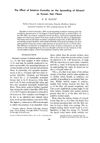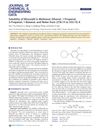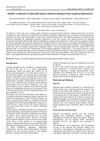 1 citations,
December 1972 in “Journal of Colloid and Interface Science”
1 citations,
December 1972 in “Journal of Colloid and Interface Science” Ethanol spreads well on hair at low humidity but less so at higher humidity due to water condensation.
1 citations,
April 2022 in “Applied sciences” Bitter melon extract may help prevent hair loss and can be used in cosmetic products.
 24 citations,
November 2018 in “International Journal of Molecular Sciences”
24 citations,
November 2018 in “International Journal of Molecular Sciences” Ethosomes improve drug delivery through the skin but may have side effects like irritation.
 1 citations,
July 2005 in “Informa Healthcare eBooks”
1 citations,
July 2005 in “Informa Healthcare eBooks” Hair follicles could be used for targeted drug delivery, with liposomal systems showing promise for this method.
 3 citations,
October 2014 in “Pharmaceutical Development and Technology”
3 citations,
October 2014 in “Pharmaceutical Development and Technology” The study found a way to improve a skin-applied minoxidil formula using a specific design method.
 20 citations,
October 2018 in “Physics and chemistry of liquids”
20 citations,
October 2018 in “Physics and chemistry of liquids” Minoxidil dissolves better in ethanol-water mixtures at different temperatures, with water playing a key role.
1 citations,
October 2015 in “The Pharma Innovation Journal” The best way to make a topical treatment for hair loss is to mix Saw Palmetto extract with 48% ethanol at the end of making the lotion.
30 citations,
November 2015 in “Advanced Pharmaceutical Bulletin” Nanoethosomes can improve the skin penetration of Lidocaine for topical use.
 24 citations,
April 2011 in “Journal of Chemical & Engineering Data”
24 citations,
April 2011 in “Journal of Chemical & Engineering Data” Minoxidil dissolves best in methanol and least in water.
1 citations,
June 2018 in “Pharmaciana” The hair tonic with 15% ethanol effectively promotes hair growth.
 32 citations,
November 2020 in “Nanomaterials”
32 citations,
November 2020 in “Nanomaterials” Excipients greatly affect how well curcumin nanocrystals penetrate the skin and target hair follicles.
 December 2019 in “Drug Analytical Research”
December 2019 in “Drug Analytical Research” Magistral pharmacies had issues with production quality and dosage accuracy.
 33 citations,
June 1995 in “Journal of Pharmaceutical Sciences”
33 citations,
June 1995 in “Journal of Pharmaceutical Sciences” More ethanol increases minoxidil delivery, but too much lowers efficiency.
 34 citations,
October 1994 in “Journal of Pharmaceutical Sciences”
34 citations,
October 1994 in “Journal of Pharmaceutical Sciences” Ethanol over 50% helps minoxidil absorb better into skin.
Minoxidil and a solvent mixture can prevent hair loss caused by chemotherapy in mice.
June 2021 in “Journal of Pharmaceutical Care Anwar Medika” The hair tonic made from cayenne pepper leaf extract is physically stable and suitable for use.
August 2015 in “아시안뷰티화장품학술지” Ethanol and ultrasonic wave extraction methods are best for making effective cosmetics and anti-hair loss products.
May 2023 in “CRC Press eBooks” Liposomes can improve hair care and treat hair issues effectively.
 September 2019 in “Journal of Investigative Dermatology”
September 2019 in “Journal of Investigative Dermatology” Researchers developed a new method to deliver molecules to hair follicles to manage hair growth without damaging surrounding skin.
 39 citations,
April 2010 in “International Journal of Pharmaceutics”
39 citations,
April 2010 in “International Journal of Pharmaceutics” Nanoparticles improve minoxidil skin permeation, but more research needed for effective hair growth.
 2 citations,
August 2019 in “Turkish Journal of Chemistry”
2 citations,
August 2019 in “Turkish Journal of Chemistry” Researchers made minoxidil efficiently using cobalt ferrite nanoparticles as a reusable catalyst.
Aloe vera hair tonic with 10% and 15% concentrations effectively promoted hair growth in male rats.
January 2013 in “วารสารเภสัชศาสตร์อีสาน (Isan Journal of Pharmaceutical Sciences, IJPS)” Carthamus tinctorius floret extract is a safe hair growth promoter with good skin absorption.
 34 citations,
April 2014 in “Psychopharmacology”
34 citations,
April 2014 in “Psychopharmacology” Stress and alcohol affect brain chemicals differently in rats, mice, and humans, influenced by genetic differences.
 1 citations,
January 2019 in “Elsevier eBooks”
1 citations,
January 2019 in “Elsevier eBooks” Neuroactive steroids may affect the risk and treatment of alcohol use disorders.
2 citations,
February 2021 in “IOP Conference Series Earth and Environmental Science” Mangkokan leaf contains various beneficial compounds like alkaloids, flavonoids, and steroids.
 33 citations,
May 2013 in “Andrologia”
33 citations,
May 2013 in “Andrologia” Some herbs show promise as antiandrogenic agents.
 7 citations,
March 2013 in “Tetrahedron Letters”
7 citations,
March 2013 in “Tetrahedron Letters” New method makes important drug ingredients more easily without needing extra purification steps.
 December 2022 in “Journal of Tropical Pharmacy and Chemistry”
December 2022 in “Journal of Tropical Pharmacy and Chemistry” The hair tonic made from oil palm leaf extract is very effective in preventing hair damage from the sun.
 August 2022 in “Yakugaku zasshi”
August 2022 in “Yakugaku zasshi” Using a steam towel, l-menthol, and carpronium before applying minoxidil nanoparticles can increase its absorption and potentially improve hair growth.



















